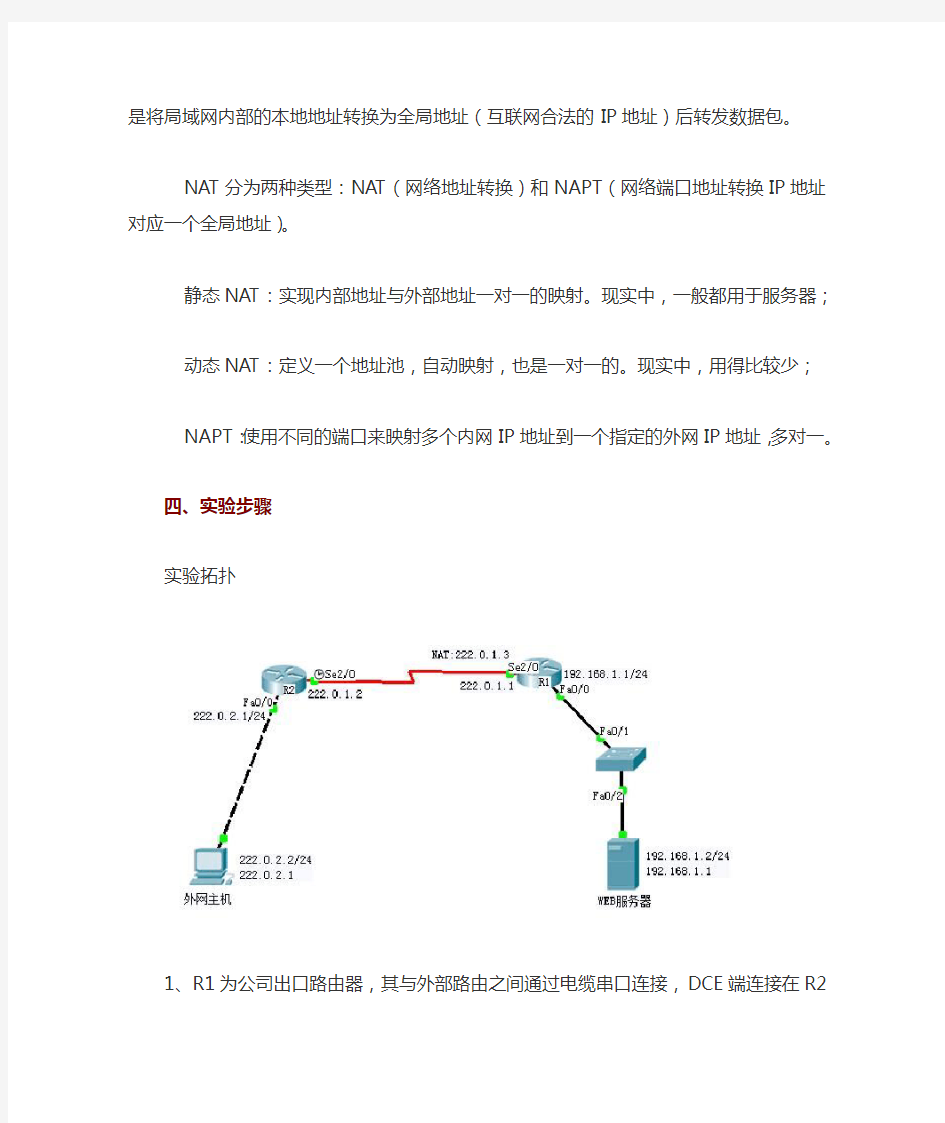

网络地址转换NAT配置
一、实验目标
理解NAT网络地址转换的原理及功能;
掌握静态NAT的配置,实现局域网访问互联网;
二、实验背景
公司欲发布WWW服务,现要求将内网Web服务器IP地址映射为全局IP地址,实现外部网络可访问公司内部Web服务器。
三、技术原理
网络地址转换NAT(Network Address Translation),被广泛应用于各种类型
Internet接入方式和各种类型的网络中。原因很简单,NAT不仅完美解决了IP地址不足的问题,而且还能够有效地避免来自网络外部的攻击,隐藏并保护网络内部的
计算机。
默认情况下,内部IP地址是无法被路由到外网的,内部主机10.1.1.1要与外部
internet通信,IP包到达NAT路由器时,IP包头的源地址被替换成一个合法的外网IP,并在NAT转换表中保存这条记录。当外部主机发送一个应答到内网时,NAT路由器收到后,查看当前NAT转换表,用替换掉这个外网地址。
NAT将网络划分为内部网络和外部网络两部分,局域网主机利用NAT访问网络时,
是将局域网内部的本地地址转换为全局地址(互联网合法的IP地址)后转发数据包。
NAT分为两种类型:NAT(网络地址转换)和NAPT(网络端口地址转换IP地址对应一个全局地址)。
静态NAT:实现内部地址与外部地址一对一的映射。现实中,一般都用于服务器;
动态NAT:定义一个地址池,自动映射,也是一对一的。现实中,用得比较少;
NAPT:使用不同的端口来映射多个内网IP地址到一个指定的外网IP地址,多对一。
四、实验步骤
实验拓扑
1、R1为公司出口路由器,其与外部路由之间通过电缆串口连接,DCE端连接在R2上,
配置其时钟频率为64000;
2、配置PC机、服务器及路由器接口IP地址;
3、在各路由器上配置静态路由协议,让PC间能相互ping通;
4、在R1上配置静态NAT;
5、在R1上定义内外部网络接口;
6、验证主机之间的互通性。
R1:
Router>en
Router#conf t
Enter configuration commands, one per line. End with CNTL/Z.
Router(config)#hostname R1
R1(config)#int fa0/0
R1(config-if)#ip add
R1(config-if)#no shut
%LINK-5-CHANGED: Interface FastEthernet0/0, changed state to up
%LINEPROTO-5-UPDOWN: Line protocol on Interface FastEthernet0/0, changed state to up
R1(config-if)#exit
R1(config)#int s2/0
R1(config-if)#ip add
R1(config-if)#no shut
%LINK-5-CHANGED: Interface Serial2/0, changed state to down
R1(config-if)#
%LINK-5-CHANGED: Interface Serial2/0, changed state to up
%LINEPROTO-5-UPDOWN: Line protocol on Interface Serial2/0, changed state to up R1(config-if)#
R1(config-if)#
R1(config-if)#exit
R1(config)#ip route 0
End with CNTL/Z.
R1(config)#int fa0/0
R1(config-if)#?
arp Set arp type (arpa, probe, snap) or timeout
bandwidth Set bandwidth informational parameter
cdp CDP interface subcommands
crypto Encryption/Decryption commands
custom-queue-list Assign a custom queue list to an interface
delay Specify interface throughput delay
description Interface specific description
duplex Configure duplex operation.
exit Exit from interface configuration mode
fair-queue Enable Fair Queuing on an Interface
hold-queue Set hold queue depth
ip Interface Internet Protocol config commands
mac-address Manually set interface MAC address
mtu Set the interface Maximum Transmission Unit (MTU) no Negate a command or set its defaults
priority-group Assign a priority group to an interface
service-policy Configure QoS Service Policy
shutdown Shutdown the selected interface
speed Configure speed operation.
tx-ring-limit Configure PA level transmit ring limit
zone-member Apply zone name
R1(config-if)#ip ?
access-group Specify access control for packets
address Set the IP address of an interface
hello-interval Configures IP-EIGRP hello interval
helper-address Specify a destination address for UDP broadcasts inspect Apply inspect name
ips Create IPS rule
mtu Set IP Maximum Transmission Unit
nat NAT interface commands
ospf OSPF interface commands
split-horizon Perform split horizon
summary-address Perform address summarization
virtual-reassembly Virtual Reassembly
R1(config-if)#ip nat ?
inside Inside interface for address translation
outside Outside interface for address translation
R1(config-if)#ip nat inside ?
R1(config-if)#ip nat inside
R1(config-if)#exit
R1(config)#int s2/0
R1(config-if)#ip nat outside ?
R1(config-if)#ip nat outside
R1(config-if)#exit
R1(config)#
R1#
R1#
R1#conf t
Enter configuration commands, one per line. End with CNTL/Z.
R1(config)#ip ?
access-list Named access-list
default-network Flags networks as candidates for default routes
dhcp Configure DHCP server and relay parameters
domain IP DNS Resolver
domain-lookup Enable IP Domain Name System hostname translation
domain-name Define the default domain name
forward-protocol Controls forwarding of physical and directed IP broadcasts host Add an entry to the ip hostname table
name-server Specify address of name server to use
nat NAT configuration commands
route Establish static routes
tcp Global TCP parameters
R1(config)#ip nat ?
inside Inside address translation
outside Outside address translation
pool Define pool of addresses
R1(config)#ip nat inside ?
source Source address translation
R1(config)#ip nat inside source ?
list Specify access list describing local addresses static Specify static local->global mapping
R1(config)#ip nat inside source static ?
Inside local IP address
tcp Transmission Control Protocol
udp User Datagram Protocol
R1(config)#ip nat inside source static ?
Inside global IP address
R1(config)#ip nat inside source static ?
R1(config)#ip nat inside source static .
Current configuration : 753 bytes
!
version
no service timestamps log datetime msec
no service timestamps debug datetime msec
no service password-encryption
!
hostname R1
!
...
!
interface FastEthernet0/0 ip address
ip nat inside
duplex auto
speed auto
!
interface FastEthernet1/0 no ip address
duplex auto
speed auto
shutdown
!
interface Serial2/0
ip address
ip nat outside
!
interface Serial3/0
no ip address
shutdown
!
interface FastEthernet4/0 no ip address
shutdown
!
interface FastEthernet5/0
no ip address
shutdown
!
ip nat inside source static
ip classless
ip route
!
...
!
line con 0
line vty 0 4
login
!
end
R1#
R2:
Router>
Router>en
Router#conf t
Enter configuration commands, one per line. End with CNTL/Z.
Router(config)#hostname R2
R2(config)#int fa0/0
R2(config-if)#ip add shut
%LINK-5-CHANGED: Interface FastEthernet0/0, changed state to up
%LINEPROTO-5-UPDOWN: Line protocol on Interface FastEthernet0/0, changed state to up R2(config-if)#exit
R2(config)#int s2/0
R2(config-if)#ip add shut
%LINK-5-CHANGED: Interface Serial2/0, changed state to up
R2(config-if)#clock rate 64000
R2(config-if)#
%LINEPROTO-5-UPDOWN: Line protocol on Interface Serial2/0, changed state to up
R2(config-if)#
R2(config-if)#
R2(config-if)#exit
R2(config)#ip route Configured from console by console
R2#show ip route
Codes: C - connected, S - static, I - IGRP, R - RIP, M - mobile, B - BGP
D - EIGRP, EX - EIGRP external, O - OSPF, IA - OSPF inter area
N1 - OSPF NSSA external type 1, N2 - OSPF NSSA external type 2
E1 - OSPF external type 1, E2 - OSPF external type 2, E - EGP
i - IS-IS, L1 - IS-IS level-1, L2 - IS-IS level-2, ia - IS-IS inter area
* - candidate default, U - per-user static route, o - ODR
P - periodic downloaded static route
Gateway of last resort is not set
S [1/0] via is directly connected, Serial2/0
C is directly connected, FastEthernet0/0
R2#
PC1:
Packet Tracer PC Command Line
PC>ipconfig
IP Address......................: Mask.....................: Gateway.................: with 32 bytes of data:
Request timed out.
Reply from bytes=32 time=19ms TTL=126
Reply from bytes=32 time=17ms TTL=126
Reply from bytes=32 time=15ms TTL=126
Ping statistics for Packets: Sent = 4, Received = 3, Lost = 1 (25% loss),
Approximate round trip times in milli-seconds:
Minimum = 15ms, Maximum = 19ms, Average = 17ms
PC>
PC1-WEB: